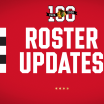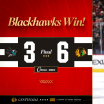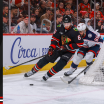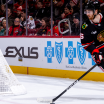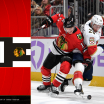Jim Pappin, a prolific goal scorer for seven seasons with the Blackhawks, has died. He was 82.
Pappin joined the Blackhawks on March 23, 1968, in a trade with the Toronto Maple Leafs, who acquired Pierre Pilote, a future Hall of Fame defenseman. Pilote had won consecutive Norris Trophies in 1963, '64 and '65 but played only one more season before retiring, while Pappin emerged as a productive right wing in Chicago.
Upon Pappin's arrival to the Blackhawks, Coach Billy Reay rearranged lines. Chico Maki moved to center for Bobby Hull and Eric Nesterenko with Pit Martin at center for Dennis Hull and Pappin. Thus, the MPH Line was formed, and it remained one of the best in the National Hockey League for several years.
VERDICT: Prolific Goal Scorer Jim Pappin Dies at 82
Forward skated seven seasons with Chicago as member of famous MPH Line
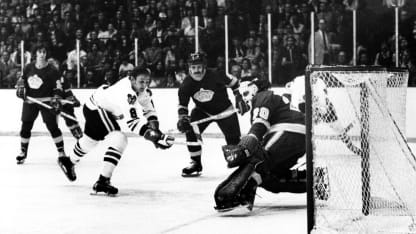
© Getty Images
By
Bob Verdi
Blackhawks.com
Pappin scored six goals in his first three games with the Blackhawks, recorded his first NHL hat trick, and by Christmas had amassed 19 goals, six more than he counted during the previous year with the Maple Leafs.
Pappin finished his debut season in Chicago with 30 goals and never scored fewer than 22 before departing the Blackhawks in 1975. Pappin's best output occurred in 1972-73, when he tallied 41 goals along with 51 assists. The Blackhawks advanced to the Stanley Cup Final, losing to the Montreal Canadiens.
Pappin accumulated eight goals and seven assists during those playoffs, similar to his haul in the 1971 postseason when he garnered 10 goals, but rued that he couldn't have had at least one more in a storied Final against the Canadiens.
The Blackhawks led that best-of-seven 2-0 and built a 2-0 lead in Game 7 at the Stadium. Pappin was among several Blackhawks foiled by the spectacular work of Ken Dryden, the Canadiens' rookie goalie who survived numerous prime efforts by the Blackhawks to build a 3-0 lead. After Montreal tied it, 2-2, Pappin had another glorious chance and was raising his stick in glee when Dryden stoned him again. Alas, the Canadiens rallied and prevailed, 3-2, to win the Cup.
After that defeat, Pappin was gutted, as were all of his teammates. He had no time for small talk in the post-mortems.
"I was a terrible loser," he recalled. "[Playing] was all I ever really wanted to do. I didn't really care for a lot of the other stuff. I didn't sign a lot of autographs. Never before a game and sometimes after a game. But not for the same people over and over."
Pappin recalled that, upon the deal with Toronto, he had been pegged as the linemate for Bobby Hull. But Hull held out during training camp in a contract dispute with management, so Reay implemented the MPH Line and it worked out seamlessly.
"I never did play with Bobby, after all," said Pappin. "Pit was fast and could move the puck. Dennis had an even harder shot than Bobby, and it was my job to help set him up, or shoot myself when there was an opening. We clicked right away."
On Feb.16, 1972, Pappin clicked as no other Blackhawk before or since. In a match against the Philadelphia Flyers, he scored at 2:57 of the third period, assisted by Andre Lacroix. Shortly - very shortly - after the next faceoff, Pappin scored at 3:03, assisted by Bryan Campbell. Pappin's two goals within six seconds is a franchise record. Bill Mosienko scored three within 21 seconds in 1952, but all with more separation.
Pappin was a big man with long, loping strides. Fans would at times be frustrated by his style, but Reay forever boosted Pappin, urging fans not to confuse activity with accomplishment.
"People don't understand what Jimmy's doing out there," praised Reay. "He doesn't just skate all over the ice for no reason. He's got great anticipation and instincts."
Reay's support was an elixir for Pappin, who did not enjoy a cordial relationship with his boss in Toronto, Punch Imlach.
"I didn't like him," said Pappin, "and he didn't like me."
Pappin, a native of Sudbury, Ontario, debuted with the Maple Leafs in 1963-64, when they won the Stanley Cup. Much to his distress, Pappin was frequently shuttled between the NHL team and its Rochester Americans farm team in the American League. In 1967, Pappin was credited with the winning goal in Game 6 of the Final, a 3-1 triumph over the Canadiens.
It was the culmination of an excellent season for Pappin, who led the NHL in game-winning and power play goals. Also, his seven goals in 12 playoff games led all playoff performers. Not surprisingly, at least to Pappin, he again saw part of the next season in Rochester, despite appearing in the 1968 NHL All-Star Game. Soon thereafter, Pappin was off to Chicago, where he became a fixture and found comfort, even after contracting a rare case of Bell's Palsy that numbed the left side of his face. He had minimal movement there for several months, but as Pappin wryly offered, at least he didn't have to go back to Rochester.
He loved a good laugh and was a willing accomplice for prankster Pat Stapleton, a star defenseman who convinced rookies that Pappin was a virtuoso musician. With mouths agog after practice one day, they watched Pappin ascend to the giant Stadium organ, sit, move hands furiously, and make magic music. Al Melgard's greatest hits, piped in via recording by staffers, facilitating another Stapleton stunt.
In 1975, Pappin was traded to the California Golden Seals for Joey Johnston. The Golden Seals moved to Cleveland, where Pappin concluded his NHL career with the renamed Barons. He retired in 1976, having posted 278 goals in 767 games and 33 in 92 playoff games.
After shedding the skates, Pappin scouted for the Blackhawks, St. Louis Blues and most recently, the Anaheim Ducks. He was an avid golfer who lived with wife Peggy for a spell in Palm Springs, and a popular figure around Chicago, appreciated by former teammates for his pragmatic ways.
Pappin's passing was duly cited in Toronto, where he ranks among the 100 greatest ever Maple Leafs, who are still seeking their next Stanley Cup clinching goal after his, 55 years ago.


